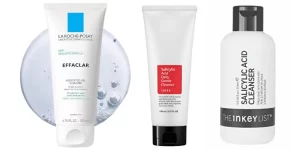
Can salicylic acid and vitamin C be used together?
Yes, you can use salicylic acid and vitamin C together, but that all depends on your skin and how it reacts to acids.
Normally these two ingredients shouldn’t be used together because they’re both acidic and can really irritate your skin causing dryness, redness, flaking, and general irritation and aging of your skin over time.
Each has its benefits but when combined and used together, they are more effective and impressive than when used alone!
Yes, when used together these two ingredients can make your skin look brighter, clearer and more youthful. So can you use salicylic acid with vitamin C? Yes, you can.

What are the benefits of using them together?
Salicylic acid and vitamin C work well together to heal the skin in a variety of ways. Salicylic acid helps remove dead cells and dirt from the pores, reducing inflammation in the process.
This makes it easier for vitamin C to penetrate deep into the skin, where it can slow down free radical production that would otherwise cause damage to the skin’s cells and DNA.
When you use salicylic acid and vitamin c together you can expect the following:
- Reduced inflammation
- Improved skin texture
- Reduced acne breakouts
| this post may contain affiliate links, which means if you purchase from one of these links, I may receive a small commission at no additional cost to you. |
The best ways to use salicylic acid and vitamin C together
To get the best skin results from both of these ingredients, you need to use them the right way.
If you’re using both salicylic acid and vitamin c together, be aware that they can react with each other when applied to your face at the same time. And this can cause dryness and irritation.
Here’s how you can minimize any side effects from using both together:
Although salicylic acid and vitamin C can provide your skin with amazing benefits, they need to be used the right way for you to be able to experience them. There are a few different ways that you can do this.
#1 Use them at different times during the day
The easiest way to get started with either salicylic acid or vitamin C (or both!) is to use them at different times of the day. This is typically recommended if you’ve never used either ingredient before or you have sensitive skin.
Vitamin C is a great way of getting sun protection during the day, so use it in the morning to reap all the benefits! It’s best not to put anything else on top of it for at least 5 -10 minutes after you’ve applied it, so it can absorb fully into your skin.
Because it’s an exfoliant, it’s always better to use salicylic acid in the evening. Whether that’s a serum, cream or toner, use it as part of your nighttime routine.
#2 Alternate days
If you’d rather err on the side of caution and not use both ingredients on the same day, then you can use your salicylic acid and vitamin C products on different days.
You can alternate ingredients every other day or every few days. Let your skin get used to the ingredients and build up from there.
And as always be extra careful if you have sensitive skin. Salicylic acid and vitamin C can cause irritation, dryness and peeling so introduce them slowly.
If you do experience irritation, stop for a few days and slowly reintroduce each acid one at a time and space out how often you use them.
#3 Use sunscreen
Salicylic acid is a chemical exfoliant, so your skin will be more sensitive to the sun’s UV rays. So make sure to wear sunscreen (SPF 30 or higher), even if you’re using Vitamin C cream as well.
It’s better to be safe than sorry. And you really don’t want sun damage to undo all the benefits of these ingredients. Wear sunscreen!
Can you use salicylic acid before vitamin C?
Yes, you can! It’s better to use salicylic acid first and then vitamin C. Using salicylic acid first means that vitamin c can penetrate your skin faster and deliver quicker results.
Salicylic acid has an exfoliating effect while vitamin C has a moisturizing effect.
When using both ingredients together one after the other, it’s better to use salicylic acid first, wait 10-15 minutes for it to work on your skin then use vitamin C. This will give you the best results possible!
Is vitamin C or salicylic acid better for acne?
Salicylic acid and vitamin C are both used to treat acne. But does one clear up acne better than the other?
Salicylic acid is a beta hydroxy acid (BHA) that can unclog pores, reduce inflammation and exfoliate and remove dead skin cells, which can help to reduce acne.
Vitamin C on the other hand is an antioxidant that helps the body to produce collagen, which in turn helps with wound healing and skin repair. It also has anti-inflammatory properties that can help reduce the redness of acne spots.
The chemical composition of salicylic acid is different from vitamin C, but they both work in the same way: by reducing inflammation and repairing the skin barrier.
Based on these properties, salicylic acid is more effective than vitamin C for acne treatment.
But which one you choose depends on what you’re looking for. If you have sensitive skin or want something more natural then go for vitamin C; if you have oily skin or want something more potent then go for salicylic acid.
Salicylic acid background
What is salicylic acid?
Salicylic acid is a beta hydroxy acid (BHA) derived from willow bark and used as an effective acne treatment. A chemical exfoliant, it helps remove dead skin cells from the surface of the skin.
It is one of the most popular types of chemical exfoliators and has been used for decades.
Its also used to treat other skin conditions like psoriasis, warts, and seborrheic dermatitis. It’s also used to reduce the appearance of fine lines, wrinkles, and uneven skin texture.
Salicylic acid is a keratolytic agent that works by breaking down a protein in the skin’s outer layer called keratin. It loosens dead skin cells and helps to unclog pores.
Salicylic acid benefits
Salicylic acid has many benefits for your skin:
- Removing dead skin cells and unclogging pores
- Getting rid of acne
- Reducing the appearance of acne scars
- Treating inflammation
- Reducing oil production on the skin
- Helping with the production of natural oils and collagen in the skin
- Improving elasticity and reducing fine lines and wrinkles
Salicylic acid side effects
The most common side effects are dry skin, redness, itching, and irritation. Follow these tips to avoid any side effects:
- Use it only once a day
- Use sunscreen when using products with salicylic acid in them
- Avoid using multiple products with salicylic acid if you have sensitive skin (this can lead to chronic dryness)
Vitamin C background
What is vitamin C?
Vitamin C is an antioxidant that helps protect the skin from damage by neutralizing free radicals and slowing the aging process of skin cells.
It helps the body produce collagen and promotes healthy skin by protecting it from harmful free radicals. It is an important ingredient in any skincare routine.
Not only does it boost collagen production, but it also has anti-aging properties. When used topically, it can help reduce the appearance of dark spots, age spots, and sun damage, giving the skin a healthy glow.
Vitamin C benefits
Vitamin C has many benefits for your skin:
- Protecting the skin from free radicals
- Promoting collagen production, which results in firmer skin
- Alleviating acne, dry skin and wrinkles
Vitamin C side effects
The most common side effects are redness, dryness, and sensitivity. Follow these tips to avoid any side effects:
- Use it as part of your skincare routine, but give it a few minutes to absorb before using other products, (it can sometimes cause pilling)
- Use a moisturizer after
- Use sunscreen if you’re directly exposed to the sun (and even if you’re not)
Can you use vitamin C after a salicylic acid cleanser?
Yes, you can use vitamin C after a salicylic acid cleanser. Using both of these ingredients at the same time will help you achieve clearer more youthful skin, just be mindful of causing irritation.
If your skin isn’t overly sensitive and can tolerate using both at the same time with little to no reaction, then you can absolutely use vitamin C after using your salicylic acid cleanser! Do what’s best for your skin.
Can you use salicylic acid in the morning and vitamin C at night?
Yes, you can use salicylic acid in the morning and vitamin C at night. However, because it’s an exfoliant, salicylic acid can make your skin more sensitive to the sun so if you decide to wear it during the day, use plenty of sunscreen.
Using it in the evening means that it has time to penetrate your skin without being exposed to too many environmental stressors. So, even though it’s okay to use it during the day, it’s best to use it at night.



